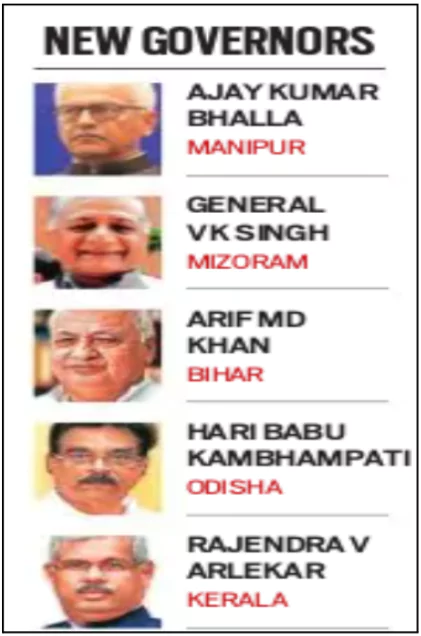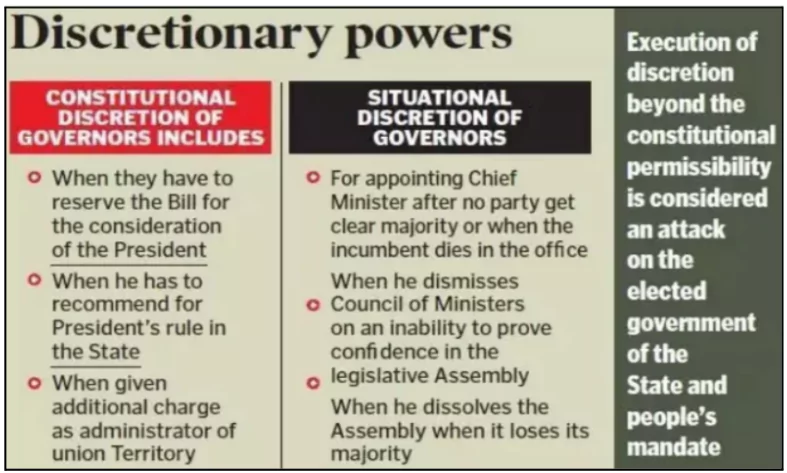In a significant reshuffle, President Droupadi Murmu appointed two new governors and reassigned three others, reorganizing the leadership in five states.

About State Governor
- Chief Executive Head of the State: The Governor serves as the chief executive head of the state, adapting principles from the Canadian model.
- Convention on Appointment: The Governor should not belong to the state where they are appointed, ensuring independence from local political influences.
- Consultation with Chief Minister: The President consults the Chief Minister of the state before appointing the Governor to ensure harmonious functioning of the constitutional machinery.
- Appointment: The Governor is appointed by the President via a warrant under the President’s hand and seal.
- This is a nominated position and not an elected one.
- Tenure: The Governor serves at the pleasure of the President and can be removed at any time.
- Oath of Office
- The Governor takes an oath administered by the Chief Justice of the state’s High Court.
- In the absence of the Chief Justice, the oath is administered by the senior-most judge of the High Court.
- Privileges of the Governor: The emoluments and allowances of the Governor cannot be reduced during their term.
- These are determined by Parliament and include privileges related to the office.
Enroll now for UPSC Online Course
Legal Precedents
- Surya Narain vs Union of India (1982): The President’s “pleasure” regarding a Governor’s tenure is not subject to judicial review.
- Hargovind Pant vs Raghukul Tilak (1979): The Governor’s role is independent and constitutional, distinct from being an employee of the Central Government.

Constitutional Provisions Related to the Governor
- Article 153: Each state must have a Governor, and one individual can serve as Governor for multiple states.
- This provision was enabled by the 7th Constitutional Amendment Act of 1956.
- Appointment: The Governor is appointed by the President and is a nominee of the Central Government.
- Articles 157 and 158: These articles define the eligibility criteria for the Governor’s position.
- Article 163: The Governor acts on the advice of the Council of Ministers, led by the Chief Minister, except in matters where they exercise discretionary powers.
Recommendation For Governor
Sarkaria Commission Recommendations for Governor
- The Governor should be an eminent individual from outside the state.
- The appointee should be a detached figure, with minimal political links or no recent active participation in politics.
- The Governor’s term should be for a fixed period of five years.
- The Chief Minister of the state should be consulted in the appointment of the Governor.
Punchi Commission Recommendations for Governor
- The Governor should be a person of eminence in public life.
- The Governor should not be a person who has recently held office in the Union or State Government.
- The Governor should not be a person who is actively involved in politics.
- The Governor should be appointed for a fixed term of five years.
- The Chief Minister of the state should be consulted in the appointment of the Governor.
- Role:
- The Governor should act as a bridge between the Union and the State Governments.
- The Governor should play a constructive role in promoting harmonious relations between the Union and the State Governments.
- The Governor should not act as an agent of the Union Government.
|
Check Out UPSC CSE Books From PW Store
Immunity Available to the Governor
- Criminal Proceedings: The Governor is immune from criminal proceedings during their term, even for personal acts.
- Protection from Arrest: The Governor cannot be arrested or imprisoned during their tenure.
- Civil Proceedings: Civil proceedings can be instituted against the Governor for personal acts, but only after a two-month notice is given.
![]() 25 Dec 2024
25 Dec 2024



